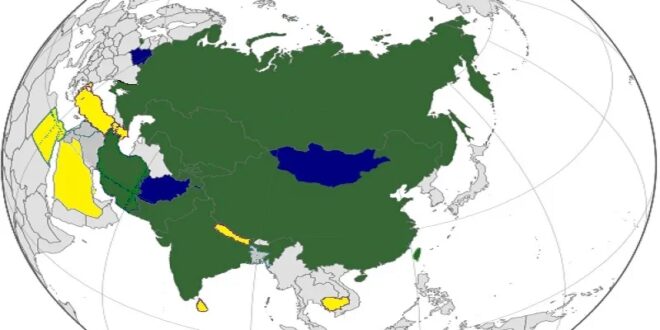Unless there’s an all-out conventional war between Iran and Pakistan, which isn’t expected unless their newly exacerbated but long-running security dilemma spirals out of control into one by miscalculation (perhaps due to US meddling), Eurasian integration won’t be dealt a deathblow. Nevertheless, very clear limits will be placed upon it as the SCO becomes further divided along yet another fault line, which will greatly impede multilateral cooperation and lead to even more dysfunction.
Pakistan’s retaliatory strikes against Islamabad-designated terrorists-separatists in Iran the day after Iran’s initial strikes against Tehran-designated terrorists-separatists in Pakistan have plunged these neighboring nations into their worst-ever crisis in bilateral relations. Prior to this point, the shared Balochistan subregion between them had been the scene of low-intensity proxy warfare that each blamed the other and their partners for waging, but neither had made any major moves up until now.
Iran’s decision to strike first was due to the perception that Pakistan had reverted to being an American puppet after April 2022’s post-modern coup and that this posed the risk of Islamabad escalating their proxy war at the US’ behest in order to weaken Iran amidst its regional proxy war right now with Israel. As for Pakistan’s decision to retaliate, this was due to the need to deter India from repeating the strikes that it carried out in 2016 and 2019, but which Islamabad always denied had taken place.
Despite Pakistan’s closeness to the US and Iran’s to India, which are one another’s top rivals, each play integral roles in China’s Belt & Road Initiative (BRI) via the China-Pakistan Economic Corridor (CPEC) and the China-Central Asia-West Asia Economic Corridor (CCAWAEC). They’re also fellow members of the SCO after Iran became a permanent one last year in the group’s first expansion since India and Pakistan joined in 2017. This makes the worsening of their tensions a threat to Eurasian integration processes.
America is interested in advancing that outcome due to its divide-and-rule designs in the New Cold War whereby it’s doing its utmost to exacerbate tensions between Eurasia’s diverse countries. In this case, it could pledge full support for Pakistan following the official restoration of trust between them after Chief Of Army Staff Asim Munir’s trip to DC last month, which improved the ties that were weakened during former Prime Minister Imran Khan’s tenure. Regional military/naval moves vis-à-vis Iran could also occur.
China’s interests are the exact opposite since its grand strategy envisages creating a global community of shared future that necessitates infrastructure-driven integration among its top BRI partners such as by linking CPEC with the CCAWEC in order to supercharge multipolar processes in Eurasia. Accordingly, it’ll likely suggest mediating between Pakistan and Iran in order to defuse this crisis between two of the world’s most powerful Muslim countries, though it’s unclear whether it’ll succeed if that happens.
The middle ground between America and China’s expected reactions is that kinetic exchanges eventually stop short of an all-out conventional war, but bilateral trust is destroyed to such an extent that Pakistan and Iran escalate their long-running proxy war against one another in the shared Balochistan subregion. In that event, China’s balancing act between them would be tested like never before, but Beijing would be inclined to tilt closer towards Islamabad than Tehran due to its much greater investments in CPEC.
To be absolutely clear, the People’s Republic will never do or support anything that could threaten the Islamic one’s legitimate interests, but geo-economic factors push it much more in Pakistan’s direction. The US would also double down on its recent rapprochement with that country in order to further entrench its hegemony over Pakistan following the reassertion of such in the nearly two years since April 2022’s post-modern coup against former Prime Minister Khan crushed that country’s multipolar dreams.
Pakistan would therefore be able to once again play America and China off against one another in pursuit of the most advantageous deals, though the military-intelligence elite that run the show behind the scenes might not let these benefits trickle down to the people. As for Iran, it’ll naturally move closer towards India due to shared security concerns stemming from Pakistan, which are all the more acute from Delhi’s perspective due to its newfound troubles with Washington and closer US-Pakistani ties.
The North-South Transport Corridor (NSTC) between them and Russia, which also branches into Afghanistan and the Central Asian Republics, will become the focal point of their cooperation in this new era of strategic relations. China will continue investing in the CCAWAEC, but pouring money into CPEC will remain the priority if forced by limited financial means to choose between them in order to prevent Pakistan’s full-blown defection to the US and the emergence of a reliable American ally on its doorstep.
The Sino-Pakistani axis would be balanced out by the Indian-Russian-Iranian trilateral, which could help mitigate Indo-Pak, Sino-Indo, and Iranian-Pak tensions within the SCO. The NSTC and CPEC won’t compete with each other since they serve different markets and interests, but their previously expected convergence within Iran likely won’t happen for a while, if at all, Meanwhile, the CCAWAEC will continue being built, but perceived Chinese favoritism of Pakistan might lead to Iran prioritizing the NSTC instead.
Unless there’s an all-out conventional war between Iran and Pakistan, which isn’t expected unless their newly exacerbated but long-running security dilemma spirals out of control into one by miscalculation (perhaps due to US meddling), Eurasian integration won’t be dealt a deathblow. Nevertheless, very clear limits will be placed upon it as the SCO becomes further divided along yet another fault line, which will greatly impede multilateral cooperation and lead to even more dysfunction.
 Eurasia Press & News
Eurasia Press & News


